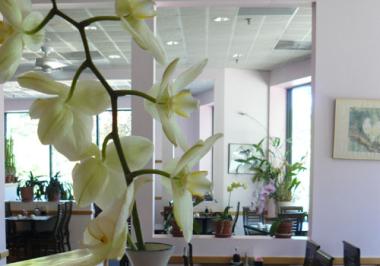Amherst Chinese Food
62 Main St., Amherst
(413) 549-0077
Open 11:30 a.m. –3 p.m., 5-9 p.m.
Entrées $7.95-$19.95; lunch specials from $5.50
The typically serene, orchid-filled restaurant that is known for its simple food and good works was converged upon several weeks ago when UMass unleashed thousands of graduates. Many showed up famished at Amherst Chinese Food. Regulars retreated. “Mr. Chang,” said a man exiting the restaurant, “Where can I give money to China?” Chang, the 80-year-old proprietor, waved his hand to the window where a vigil for earthquake victims was being held.
Entering the small pink lobby, we found ourselves part of an organized throng. The manager handed us off to Chang, who put us into a holding pattern at an empty table while ours was cleared off. We sat, were watered and given tea, and within seven minutes had appetizers and drinks. The waitstaff, all wearing black and white, were bobbing and weaving, one desperately seeking the recipient of a plate of scallops with candied walnuts. My guest, an observer of people, noted that during the course of our meal the table for six behind me turned over twice, the generations of hippies replaced by three generations of what are now called “hybrid-driving latte drinkers.”
Last year, the restaurant was named by Gourmet Magazine as one of the 10 best “farm to table” restaurants in the U.S. Amchi, as it is fondly called locally, is ahead of the curve. Many local restaurants maintain strong ties with area farms and butchers, but Amherst Chinese itself owns 35 acres in Whately and South Deerfield. Our first taste of Amherst Chinese Restaurant’s offerings—thin strands of tender Chinese leek stalks lacing steamed pork dumplings–was testament to that. This Chinese vegetable can only be had at Amchi, where authentic preparation, mixing salt, sweet and sour, brings it to life. Eggplant, bitter melon, water spinach and seven other vegetables, as well as fiddleheads and asparagus, are featured prominently on the menu this time of year.
Amchi doesn’t use as much garlic as other Asian restaurants. It favors natural essences of red chili peppers and spicy tea sauce. Upon my recommendation, my friend ordered fiddleheads with chicken as an appetizer. He looked with concern at the pile of green fern curls before him. “They taste like, I can’t say…” he said. His gustatory balance was regained when a plate of fried shrimp, juicy and crunchy, arrived soon after as a chaser. For a main course, I ordered eggplant with garlic sauce and he opted for orange-flavored beef. The latter was sweet and spicy with plenty of kick. The yin of the orange met the yang of the spicy beef, which melted in the mouth. My dish had a more subtle appeal. Luscious and silky, the eggplant had nary a seed in its pale purple luster and, with a tiny dash of soy, had a complex, satisfying flavor.
Also offered on the menu are crispy soft shell crabs, eight soups, 18 appetizers and three kinds of duck, including Peking duck with four homemade pancakes. It is traditional in the sense that it has lunch specials, most comprising dishes found on other Chinese restaurant menus. But there is no shredded egg in the fried rice, for example, and the organic vegetables are given the attention most places give their cuts of meat and fish.
What the trendiest restaurants in New York started to do two years ago Chang did in the ‘70s, after receiving his doctorate in plant science at UMass. He stayed in the area and invested in farmland for mass production of bean sprouts with an acre of vegetables to supply his own restaurant. Organic farming at Chang Farm began in 1995 and schizandra berries were chosen as a crop for the production of a medicinal drink. According to the restaurant’s literature, the berries were highly valued in the days of the Dynasties for their ability to restore some of the lustier characteristics of youth. ChiBerrie can be purchased at the restaurant and will soon be available at Whole Foods.•



